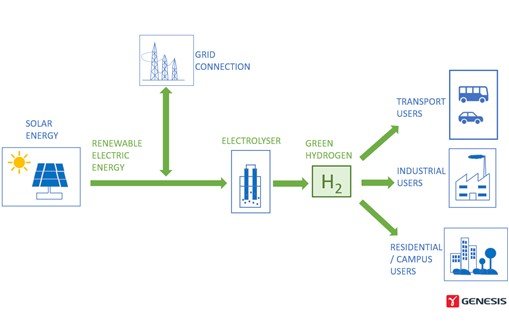CHALLENGE
A leading gas distribution is promoting and investing in the energy transition, one of the main pillars of innovation in our industry.
The Power to Gas Project is an ambitious initiative developed by a workgroup constituted by the client; university as a scientific advisor; Genesis and Technip Energies as the engineering advisor; and other institutional partners.
The Power to Gas plant is green hydrogen technology integrated with a solar photovoltaic system, strategic integration of various technologies to support the development of hydrogen infrastructure in Italy to reduce industrial CO2 emissions and other ‘hard to decarbonise’ sectors. The project will provide a clear pathway to support the country to meet its net-zero targets.
UNDERSTANDING

The Power to Gas plant produces Green Hydrogen by means of water electrolysis, with renewable electric energy generated by an integrated photovoltaic plant system.
The produced hydrogen is intended to be used in blending with natural gas, utilising the existing gas grid infrastructure and new hydrogen infrastructure to decarbonise heating in the domestic and public sectors. The produced hydrogen will also be used for transport purposes, installing dedicated hydrogen refueling stations to fill private and public road vehicles. Dedicated hydrogen storage systems are provided to support both hydrogen injection in the natural gas grid and transport refueling operation.
A 0,5-Megawatt hydrogen alkaline electrolyser, integrated with a 1 Megawatt photovoltaic system, aims to reduce CO2 emissions replacing natural gas, diesel, or heavy fuel oil, demonstrating the successful integration of existing technologies in this new service.
By 2028 the plant will supply hydrogen to residential (10% natural gas blending, replacing domestic natural gas), industrial users (20% natural gas blending, replacing heavy fuel oil), and transport users (4 buses, replacing diesel).
SOLUTION
Genesis has been providing technical support to the project for the last year, completing the Feasibility Study for the conceptual evaluation of the project then the basic engineering design phase for supporting the permitting activities.
As a holistic advisory service provider, Genesis was tasked with supporting the project partners in making technology and integration decisions to select a feasible and economic concept design.
In the Feasibility Study Genesis developed the integrated technology Block Flow Diagrams, Preliminary Plot Plan, the Cost Estimate, Economic Analysis, Carbon Footprint evaluations, and the Climate Funding Analysis (Focus on EU Innovation Fund), supporting the client to select the best configuration in terms of hydrogen final users and integration between renewable energy generation and electrolysis.
The Genesis Climate Finance Advisory Service catalyses global “low-carbon” finance efforts into funding opportunities and so valorizing our client’s energy transition conceptual studies and projects, making them “fit-for-funding” and aligned to the latest international standards.
The Climate Finance service is part of the feasibility process and considers technological aspects as well as business planning, project execution, and post-award monitoring. Every step from initial conceptual development, through finance and funding evaluations, to the grant finalization, is always fully participated by and clear for our clients. Climate Finance Screening has been launched to pursue the project development and the EU Innovation Fund applicability study has been developed at the end of the Feasibility Study.
During the Basic Engineering Design Phase, Genesis developed the complete set of deliverables to support permitting activities, such as Process Design Basis, Material Balance, Process Flow Diagrams, Detailed Plot Plan & Building Layout, Emergency and Shutdown Philosophy and the Site Work Description.
The most recent work has been focused on evaluating and selecting a definitive concept for progressing towards the plant construction, including support to contact the technology providers and to finalise permitting activities.
Overall, Genesis assessed key technical and safety performance criteria in conjunction with the project economics to ensure the selection of an optimum concept to maximise economic performance while ensuring minimisation of the overall carbon footprint.
RESULT
Genesis completed the Feasibility Study and Basic Engineering Design phases and provided support for the follow-on stages to continue the project to Construction Phase.
The Project increased the relationships between companies in innovative sectors and also cemented Genesis's track record in green hydrogen and the energy transition.
Get in touch
If you require more information, please contact your local Genesis representative.



